
I NEED HELP

You're supporting someone else
If you’re looking for support for someone else, check out the guidance on how you can help, depending on the situation


If you’re looking for support for someone else, check out the guidance on how you can help, depending on the situation


We all have mental health, just as we all have physical health. And there is no health without mental health. "Mental health is a state of wellbeing where every individual realizes his or her own potential. Mental health includes emotional, psychological and social wellbeing. As such, we realize that the mental health of one person touches all those around him or her. Our mental health affects how we think, feel and act. It also helps determine how we handle stress, establish and maintain relationships with others, work productively and make choices." Mental health, like physical health, can fluctuate on a spectrum from good to poor. We encounter protective factors and risk factors in our personal and professional life that impact our health. When we have more risk factors than protective ones, we may experience ill-mental health or a mental disorder. One in four persons will go through a mental disorder at any point in their lives. Extra resources: WHO: Introduction to Mental Health
Click here for more
Mental health, like physical health, can fluctuate on a spectrum from good to poor. We encounter protective factors and risk factors in our personal and professional life that impact our health. When we have more risk factors than protective ones, we may experience ill-mental health or a mental disorder.
Click here for more
Mental and substance use disorders are health conditions. Imagine having a broken leg: you would not expect from someone to tell you to get over it, get up and be strong. It is necessary to get treatment and support and allow time for your leg to heal. It is quite similar with mental and substance use disorders. There are different types of mental and substance use disorders, each with its specific symptoms. They generally affect the person’s thoughts, emotions, perceptions, behaviour and relationships with others as well as the ability to perform daily activities such as personal care, work, school, university, social interaction etc. Mental disorders are common. They affect 1 in every 4 individuals at any point in their lives. Just like other health conditions, mental and substance use disorders are caused by a combination of factors: Biological factors: such as illness (heart disease, chronic pain or cancer) Social factors: such as unemployment or family problems, displacement or in situation of refuge, wars and armed conflicts Psychological factors: such as adverse childhood experiences Mental and substance use disorders impose a high burden on the concerned person, the caregiver, the family as well as the society at large. They significantly impact health and wellbeing, leading to major social, human rights and economic consequences in all countries around the world. Mental disorders might cause the person to have suicidal ideations and sometimes attempting to end their lives. There are effective treatments for mental and substance use disorders; with adequate care and support, persons are able to live, work, learn and participate fully in their communities. Examples of mental disorders: Depression Anxiety Substance use disorder Post-traumatic stress disorder (PTSD) Bipolar disorder Mental disorders might cause the person to have suicidal ideations and sometimes attempting to end their lives. Too many persons are lost every year. And this should not be the case because effective treatments are available and there is always someone ready to support. Call the National Suicide Prevention Lifeline, Embrace Lifeline, on 1564 anytime between 12pm and 5:30am.
Click here for more
Mental disorders might cause the person to have suicidal ideations and sometimes attempting to end their lives. Too many persons are lost every year. And this should not be the case because effective treatments are available and there is always someone ready to support. Worldwide, one person dies every 40 seconds due to suicide. • Self-harm: It is the act of deliberately harming oneself with no intention to end one’s life. It is not a suicidal attempt. Rather, the concerned persons are trying to cope with the personal distress that they are going through. It is mainly an unhealthy way to reduce and manage stress and get distracted from painful emotions through physical pain. • Suicide: It is the act of voluntarily and intentionally ending one’s own life. Suicide is a serious condition that needs immediate care and support. Suicide is a tragic reaction to stressful life situations. People who experience suicidal thoughts and feelings are suffering tremendous emotional pain. People who died by suicide typically had overwhelming feelings of hopelessness, despair, and helplessness. Suicide is not about a moral weakness or a character flaw. People considering suicide feel as though their pain will never end and that suicide is the only way to stop their suffering. Suicide is preventable. Persons considering suicide might show common warning signs (see image above). If those signs are detected and addressed, many lives can be saved. Talking about suicide will not make a person at risk to attempt suicide. Instead, it can encourage him or her to speak up and seek help. Call the National Hotline for Emotional Support and Suicide Prevention, Embrace Lifeline, on 1564 anytime between 12pm and 5:30am for support or orientation to mental health services. More resources: WHO's Peventing Suicide: World Mental Health Day 2019 WHO's Preventing Suicide in Different Settings and Groups: Arabic
Click here for more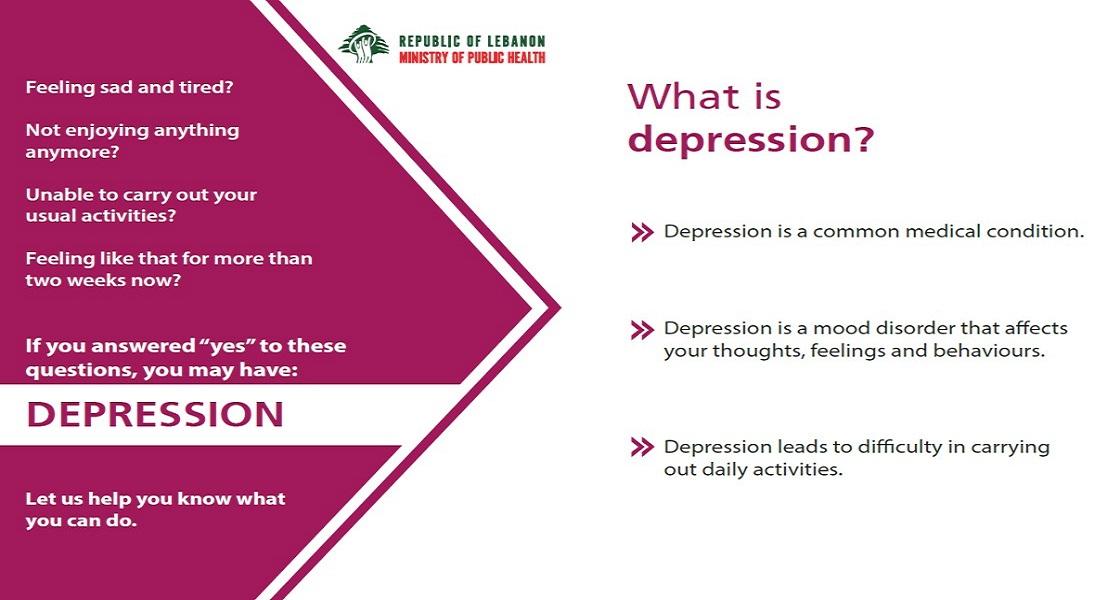
Feeling sad and tired?Not enjoying anything anymore?Unable to carry out your usual activities?Feeling like that for more than two weeks now? If you answered yes to any of these questions, you might have depression. Let us help you know what you can do. Depression is a common health condition that causes persistent sadness and loss of interest. Depression affects how we feel, think and behave. It can cause various emotional and physical problems such as the inability to carry out normal day-to-day activities like work, studies, or other. Everyone feels sad from time to time, but persons with depression experience some of the main symptoms (see image above) for at least two weeks. Like any other medical condition, depression can happen to anyone. Depression can be treated. If you think you have depression, or know someone who has depression, seek professional care as soon as possible. The earlier you seek treatment, the more effective it is. Pay attention to ideas of self-harm or suicide. If these thoughts occur, seek help immediately. Always remember, it is the depression that is causing you to have unrealistic negative ideas about yourself, your life and your future. Recovering from depression is not a matter of will power. Being able to talk about depression and seeking support and treatment is a sign of strength. More resources: Depression: Let’s Talk about it to get out of it (MOPH) I had a black dog, his name was depression (WHO) Depression: #LetsTalk – Angelo's Story (WHO)
Click here for more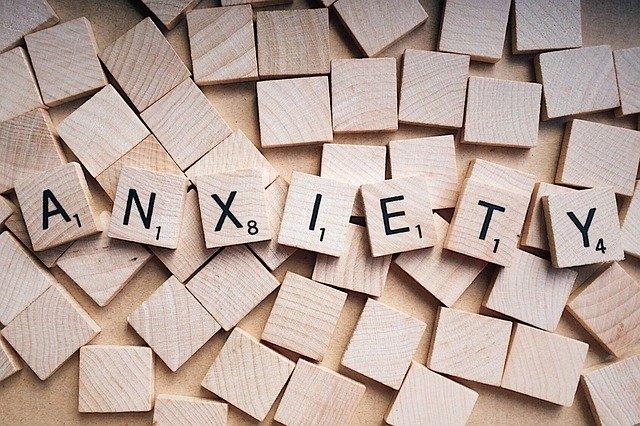
Do you often feel stressed, worried, overwhelmed or nervous? Has nervousness or anxiety prevented you from doing something? Do you experience repeated brief episodes of uncontrollable and intense fear or panic? Do you avoid places, things or situations because of persistent fears? Do you experience bodily aches and pains with no apparent medical cause? If you answered yes to any of the above, you might be suffering from an anxiety disorder. Let us help you know what you can do. Experiencing occasional anxiousness is a normal part of life, especially when facing a stressful situation, for example before exams, when expecting a baby, during job interviews, or when doing health examinations. However, persons with an anxiety disorder frequently have intense, excessive, and persistent worry and fear about everyday situations. Anxiety disorders involve persistent worry that may get worse over time and may interfere with daily functioning. Examples of anxiety disorders include generalized anxiety disorder, panic disorder, and phobia. Anxiety can happen to anyone, even children. Generalized anxiety disorders (GAD): Characterized by persistent, excessive, and unrealistic worry about everyday things, even when there is little or nothing to provoke it. These feelings are associated with at least 3 of the following additional symptoms: feelings of restlessness or being on edge, easy fatigability, trouble concentrating, irritability, muscle tension, and sleep disturbance, and the symptoms must be present for at least 6 months and on more days than not. Additionally, these symptoms are not explained by another psychiatric or medical condition. GAD is also frequently comorbid with medical disorders including chronic pain, headaches, irritable bowel syndrome, and sleep disorders. The worry experienced by persons with Anxiety Disorders affects daily functioning and produces disturbances in the daily routine of the person. Panic disorders: These disorders involve recurrent and unexpected episodes of panic attacks which are sudden feelings of intense fear that trigger severe physical symptoms (such as rapid breathing, increased heartbeat, sweating, feeling breathless, shivering or shaking, etc.) These feelings reach a peak within minutes, when there is no real danger or apparent cause. After a panic attack, a person might spend a long time in constant fear of another attack. Panic attacks do not cause death but they can be very frightening and significantly affect the person’s quality of life. Phobia: Type of anxiety disorder characterized by irrational and unreasonable fears that appear when a person is faced with an object or a situation that poses little real danger. They provoke anxiety and avoidance and affect daily functioning. Examples of phobias are: phobia from closed places (or claustrophobia), heights (or acrophobia), animals (or zoophobia), social phobia, etc. Asking people with anxiety disorders not to be anxious and to control their thoughts does not help; on the contrary, it makes negative thoughts stronger and more frequent. What causes anxiety? Stressful events e.g. starting school, moving, the loss of a family member and getting unemployed etc. Gradual stress build-up Use of substances Experineces of trauma How can anxiety be treated? Psychosocial support Increase social support Encourage healthy lifestyle habits Reduce and manage stress Psychotherapy Psychotherapies that have proven effective include: psychoeducation, Cognitive Behavioural Therapy (CBT), as well as other therapies Pharmacological treatment Medication, especially antidepressants, can be very helpful when prescribed by a trained medical doctor. It is possible to combine many of these options to achieve the best results. If you think you may have an anxiety disorder, or know someone who might have an anxiety disorder, seek professional care as soon as possible. The earlier you seek treatment, the more effective it is.
Click here for more
Is your substance use becoming a concern to you or your loved ones? Have you ever tried to stop using substances and failed? Have you used substances to self-medicate? Are you having trouble completing daily responsibilities like working, doing housework, studying, or caring for yourself? Have you ever been injured or experienced an accident because of using substances? Do you feel an uncontrollable urge to use a substance that won’t go away until you do? If you answered yes to any of the above, you might be suffering from a substance use disorder. Let us help you know what you can do. Substance use disorders are health conditions that include the harmful or hazardous use of psychoactive substances, which can lead to dependence. Psychoactive substances are substances that cause an alteration to the mental processes (thinking, mood, etc.) when taken, ingested, or administered. Psychoactive substances include legal (coffee, alcohol, tobacco, medication) and illegal substances (cannabis, heroin, cocaine, etc.). Substance use disorders occur when the recurrent use of the substance leads to health problems as well as to the inability to fulfil major responsibilities at work, school, or home. The overuse of substances leads to detrimental effects on the person's physical and mental health and might lead to addiction. The harmful use of alcohol results in 3.3 million deaths worldwide each year. The exact causes of substance use disorders are not known. It is an interaction among many factors such as genes, emotional distress, and mental disorders such as depression, etc. Reasons often cited include: To feel relaxed and calm To feel happy To relieve pain To cope with stress To feel more confident in social situations Peer pressure Misconceptions Desire to experience something new Persons with substance use disorders often need support and assistance to begin the journey towards abstinence. It is not a personal choice to keep using addictive substances. Addiction is marked by observable and predictable changes in the brain, which make it difficult to quit using. With this in mind, it is easier not to judge. How can substance use disorders be treated? Psychosocial support Adopting strategies for reducing and stopping use Ensuring proper housing, employment and a supportive social network Facilitating access to community support services Providing support to carers and family members Teaching self-care tips Psychotherapy. Psychotherapies which have been proven to be effective include: Psychoeducation, Motivational Interviewing, mutual help groups and other therapies. Pharmacological treatment Medication can sometimes be used by trained medical doctors to support the person through the detoxification phase (the process of removing toxic substances from the body) or as a longer-term intervention. It is crucial to note that detoxification interventions must always be followed up by adequate rehabilitation programs to minimize the risk of overdose following following detoxification (due to a decreased tolerance level). Providing medical treatment for co-occuring medical conditions. It is possible to combine many of these options to achieve the best results. If you think you may have a susbstance use disorder, or you know someone who might have a substance use disorder, seek professional care as soon as possible. The earlier you seek treatment, the more effective it is. More resources: Anyone Can Become Addicted to Drugs (NIH)
Click here for more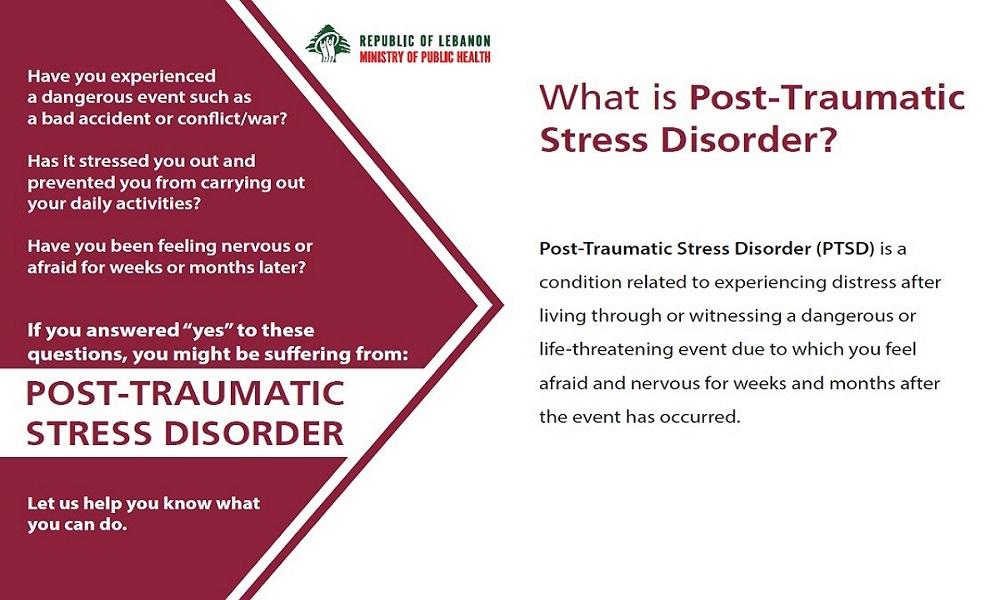
Post-Traumatic Stress Disorder (PTSD) is a condition related to experiencing distress after living through or witnessing a dangerous or life-threatening event due to which you feel afraid and nervous for weeks and months after the event has occurred. It can happen to anyone, even children. Post-traumatic stress disorder can happen to anyone, even children. Post-traumatic stress disorder can be treated and it is important to visit your healthcare provider to help you get back to your usual activities faster.
Click here for more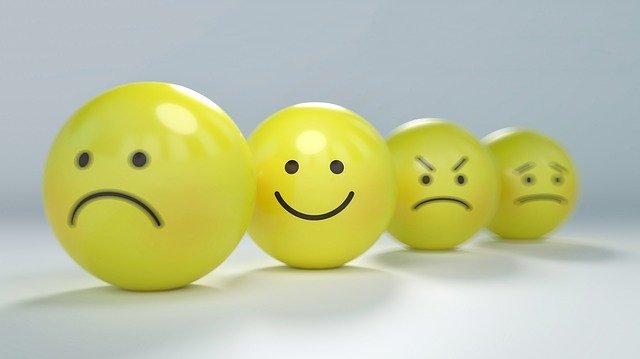
Bipolar disorder typically consists of both manic and depressive episodes separated by periods of normal mood. Manic episodes involve elevated or irritable mood, over-activity, pressure of speech, inflated self-esteem and a decreased need for sleep. People who have manic attacks but do not experience depressive episodes are also classified as having bipolar disorder.
Click here for more
Just like for physical health disorders, there are effective treatments for mental disorders. Treatment plans can include medication and/or lifestyle changes and/or psychotherapy. Life style changes can promote recovery. These include for example a) getting enough sleep, b) participation in physical activities, c) participation in social activities that you enjoy, etc. Studies have shown that these changes in lifestyle are effective in prevention and in treatment of mental disorders. Psychotherapy can help the person understand the condition he/she is going through better and to develop his/her skills to cope with the life stressors and daily challenges. Medication can help in decreasing symptoms and accelerating recovery. There are different types of medication that have proven to be effective in treating mental disorders. They should be prescribed by the doctor only. How to get more help when needed: Talk with someone you trust: Most people feel better after they talk about their feelings with someone who cares about them. Talk with a licensed psychotherapist: He/she can help you by offering talk therapies which have been shown to be effective. Talk with your family doctor or psychiatrist: He/she can help diagnose the problem and initiate treatment. There are four types of mental health professionals (see image above), each having their own qualifications. Call the Embrace Lifeline 1564 for information above available services close to where you are.
Click here for more
Worried about someone? Learn how to support them. Let them know you care and willing to listen Treat them with respect and dignity. Talk with them about their feelings. Suggest that they should speak to someone they feel comfortable with (their GP or other mental health professional). This may help them feel better. Offer assistance (i.e. find someone they trust talking with and make the appointment or arrange the meeting, and if they wish, be with them at the time). Share information sourced from a health professional or a self-help book with relevant strategies. Provide them with information to access e-mental health resources. Seek guidance from a health professional if their mental health deteriorates or you believe they are at risk of harming themselves or others. Identifying suicidal thoughts early on is important for prevention and treatment. If you know someone who is struggling with suicide, you may find the below tips useful. Speak Up If you feel a friend or a family member is at risk of harming themselves, ask them directly about it. Talking about suicide is not easy because suicide may be viewed as a taboo in our society. You can bring up the subject by saying something like: I have noticed that you have been different lately. I was wondering how you are doing. You haven’t seemed yourself lately. I wanted to check on you. When did these feelings begin? How can I support you right now? How can I be of any help? Have you thought about getting help? These feelings will change even though you may not believe it now. I care about you and I want to help you, even though I may not be able to know how you feel. When you feel you want to give up, ask yourself to hold on for just one more day, or hour, or minute, whatever you can manage. Encourage your friend to reach out to the national suicide prevention lifeline “1564-Embrace Lifeline."
Click here for more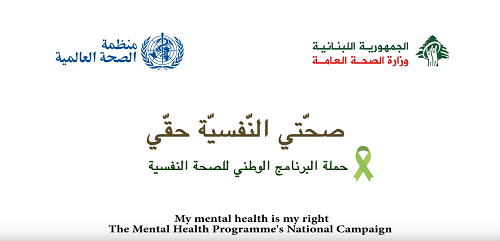
The Ministry of Public Health (MoPH), launched the National Campaign for World Mental Health Day: “Mental health is my right” “صحتي النفسية حقي” in 2015. The video released as part of the campaign emphasizes through different professionals that mental health has a whole system in the country that is being geared to ensure equitable access to all to quality mental health services; and that all people have the right to consult and seek treatment. For more info on the campaign, check the press release link: here
Click here for more